An espresso machine represents one of the most critical investments when opening a café. How do you select the right machine that meets professional standards, guarantees quality, and fits your budget? This comprehensive guide from Hello 5 Coffee will help you avoid common purchasing mistakes and understand the essential criteria for selecting your café’s espresso machine.
Common Mistakes When Selecting Café Espresso Machines
If you lack extensive coffee industry knowledge, thoroughly research authoritative information before purchasing to build a solid foundation of understanding. Avoid buying low-quality machines that don’t match your café’s needs and won’t justify your investment. Here are four common mistakes customers make when purchasing café espresso machines.
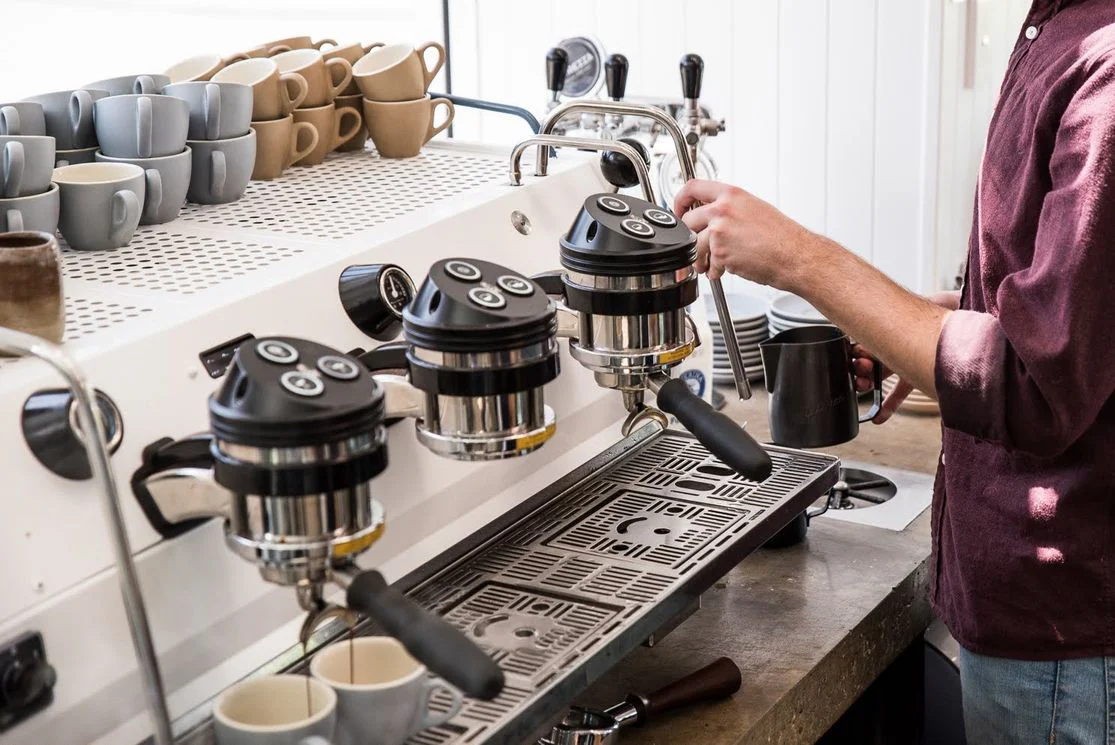
Mistake #1: Choosing Low-Capacity Machines
Never select machines with insufficient capacity, assuming you’ll upgrade later. As your customer base grows, low-capacity machines won’t meet increasing business demands. What seems adequate for opening day becomes a bottleneck within months.
Mistake #2: Using Home or Office Machines for Commercial Use
Always choose machines specifically designed for café environments. Don’t try saving money by purchasing home or office machines. While you’ll save on initial costs, these machines absolutely cannot meet quality standards or provide the longevity required for commercial service. A $500 savings upfront can cost thousands in lost customers and equipment replacement.
Mistake #3: Underestimating Daily Volume Needs
Even for small café operations, select machines capable of extracting at least 100 cups daily. Underestimate at your peril—busy days will expose capacity limitations immediately, creating customer dissatisfaction and operational stress.
Mistake #4: Neglecting Maintenance Training
Always ask sellers for detailed instructions on proper machine operation, daily cleaning routines, weekly maintenance schedules, and monthly deep-cleaning procedures. Following manufacturer guidelines ensures maximum machine longevity and prevents service interruptions due to avoidable errors.
When you’ve decided to open a café, invest correctly from the start. Don’t let budget constraints lead you into these regrettable mistakes. Your espresso machine is your café’s “soul”—the factor that creates delicious beverages and keeps customers returning. Avoid these pitfalls to ensure long-term success.
6 Essential Criteria for Choosing Your Café Espresso Machine
Your espresso machine determines beverage quality, attracts customers, establishes professionalism, and directly impacts your café’s revenue. To ensure all these factors align positively, consider these six criteria before selecting your café’s espresso machine.
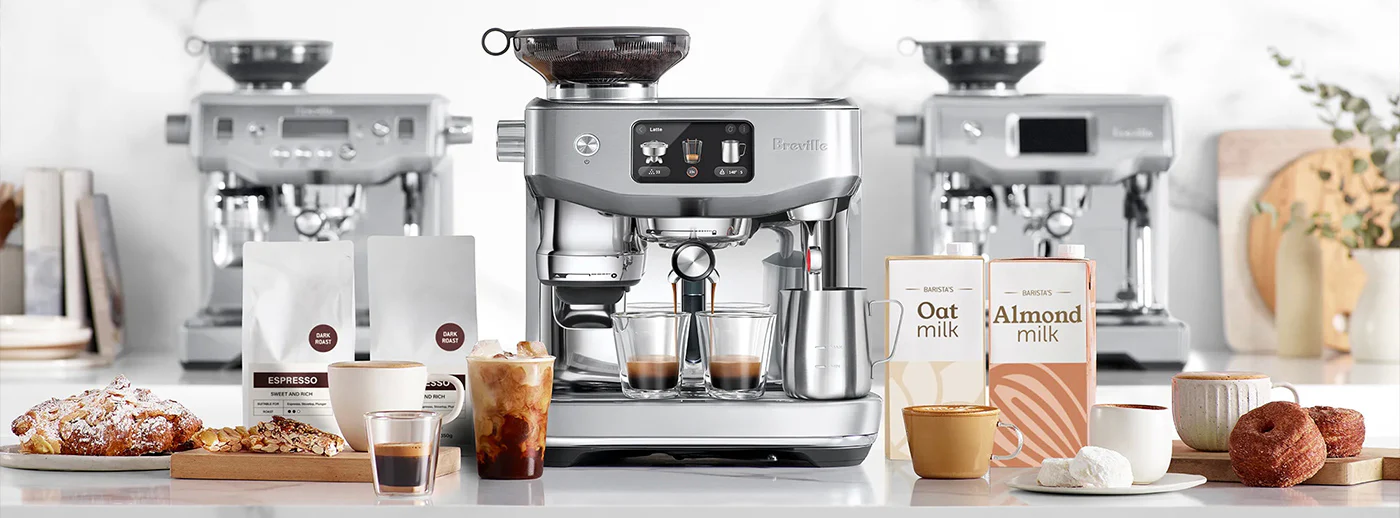
1. Service Capacity
Service capacity ranks as the most critical factor café owners must evaluate. Machine capacity largely determines customer service speed. If your machine is too weak and extraction takes too long, customers lose patience. The likelihood? They’ll buy once and never return, causing you to lose business permanently.
This matters especially for newly opened cafés where attention to every detail is essential. Owners must perfect everything from service execution to beverage quality. If customers visit your café for the first time and experience slow preparation or poor-quality drinks, they’ll develop negative impressions, leave bad reviews, and never give you a second chance.
Understanding Capacity Ratings:
Commercial espresso machines are typically rated by daily cup capacity:
- Entry-level machines: 100-150 cups per day
- Mid-range machines: 200-300 cups per day
- Professional machines: 350-500+ cups per day
Consider your projected customer flow during peak hours. If you expect 30 customers per hour during morning rush, you’ll need a machine that can handle continuous extraction without performance degradation.
2. Number of Group Heads
Group heads directly impact preparation speed and operational efficiency. Machines with two or more group heads significantly reduce preparation time, ensuring customers don’t wait excessively long for espresso-based beverages.
Group Head Capacity Guidelines:
On average, one group head completes extraction in approximately 1 minute. Add preparation and serving time, and each espresso-based drink takes roughly 3-5 minutes from order to delivery.
Choosing Based on Café Size:
- Small cafés (under 200 cups/day): Single-group machines suffice for moderate customer traffic and limited space
- Medium cafés (200-350 cups/day): Two-group machines provide optimal speed and flexibility
- Large cafés (350+ cups/day): Three-group or multiple machines become necessary
Multiple group heads allow simultaneous preparation of different drinks, dramatically improving workflow during rush periods. One barista can extract espresso on one head while steaming milk on another, creating assembly-line efficiency.
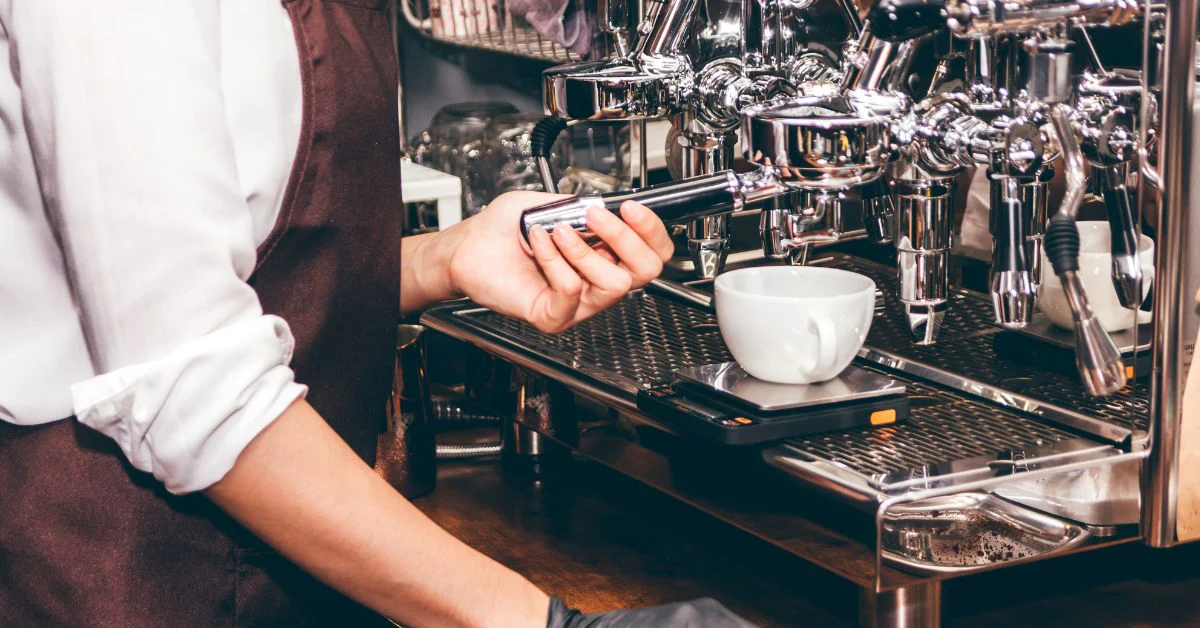
Read more: The Most Popular Coffee Machines in Vietnam.
3. Boiler Size
The boiler stores hot water and generates steam pressure for espresso extraction. Machines with undersized boilers struggle to maintain consistent quality during continuous service.
Standard Boiler Capacities:
- Single-group small machines: 0.4-1.5 liters
- Single-group large machines: 5-6 liters
- Two-group machines: 11-12 liters
- Three-group machines: 15-20 liters
Boilers heat water and create the pressure necessary for proper extraction. Larger boilers ensure better coffee quality and enable continuous operation without interruption, even during sustained high-volume periods.
For machines with smaller boilers, monitor extraction quantities carefully. After approximately 10 shots, allow the machine brief recovery time for the boiler to reheat water properly. This prevents temperature drops that compromise extraction quality and taste.
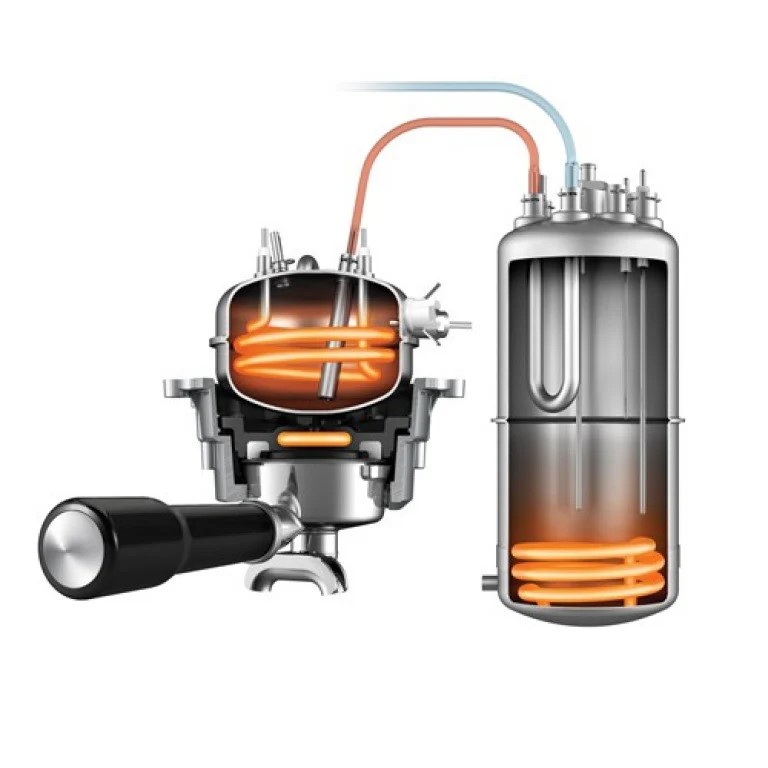
Modern Dual-Boiler Advantage:
Dual-boiler systems feature separate boilers for brewing and steaming, ensuring consistent temperature control for both processes and eliminating temperature fluctuations during shot preparation—especially advantageous in high-volume cafés.
4. Temperature Stability
Temperature represents the pivotal factor determining espresso quality post-extraction. For proper espresso, brewing temperature must reach 90-95°C (194-203°F) to achieve correct flavor intensity, richness, and aromatic complexity.
Typically, machines with larger boilers maintain more stable temperatures, ensuring consistent quality across every cup. Temperature fluctuations create inconsistent extraction—some shots taste perfect while others disappoint. Consider this factor carefully before purchasing.
Temperature Stability Indicators:
- PID temperature control: Digital systems maintaining precise temperature within ±1°C
- Thermal stability: How quickly machines recover to optimal temperature between extractions
- Pre-infusion capability: Gradual water introduction before full pressure, ensuring even extraction
Professional machines invest in sophisticated heating elements, insulation, and temperature monitoring to eliminate the variability that plagues lower-quality equipment.
5. Machine Brand and Reliability
Never choose machines with unclear origins, unknown manufacturers, or questionable quality. While cheaper options exist, they compromise coffee flavor, break down frequently, and offer poor longevity. You’ll spend more on repairs and replacements than you saved on the initial purchase.
Select established espresso machine brands with proven reputations in professional coffee equipment. Look for manufacturers with decades of experience producing commercial-grade machines trusted by specialty coffee shops worldwide.
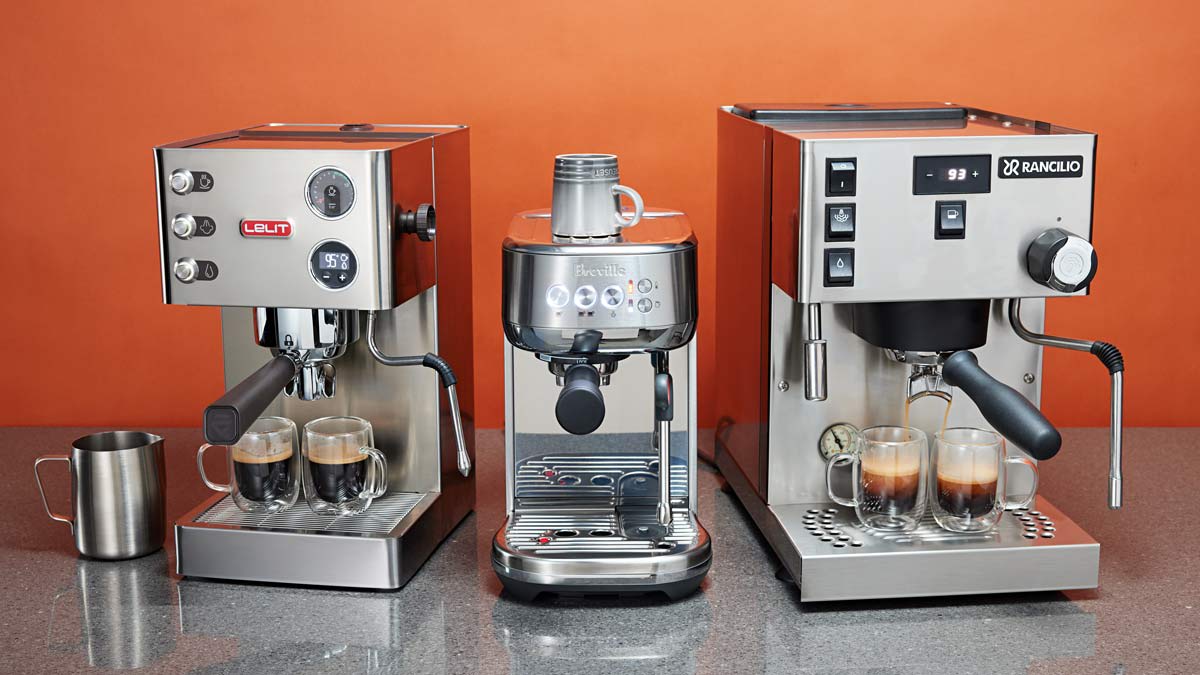
Recommended Professional Brands:
Research machines from manufacturers known for reliability, including brands like La Marzocco, Nuova Simonelli, Victoria Arduino, Synesso, Slayer, Dalla Corte, and other established professional equipment makers. These companies have earned their reputations through consistent performance in demanding café environments.
Why Brand Matters:
Currently, espresso machines are typically positioned at the counter where customers see them immediately upon entering. Using professional, recognizable equipment earns customer confidence and trust. A quality machine signals that you’re serious about coffee and creates positive first impressions that translate to customer loyalty.
Additionally, established brands offer:
- Reliable parts availability: Quick repairs when needed
- Technical support: Expert assistance for troubleshooting
- Warranty protection: Comprehensive coverage for commercial use
- Resale value: Quality machines retain value if you upgrade
6. Machine Type Selection
Depending on your café’s characteristics, needs, and investment budget, select the machine type that best fits your operation. If you’re running a chain or large-scale, professional operation, invest in advanced machines that meet exacting quality standards and handle demanding preparation requirements.
For smaller café operations seeking cost efficiency, consider certified refurbished commercial machines rather than new equipment. However, absolutely never choose home or office machines for café operations, regardless of cost savings.
Machine Type Categories:
Semi-Automatic Machines:
- Barista controls extraction time and volume
- Provides maximum control over shot quality
- Requires skilled operators
- Best for specialty coffee focus
Automatic Machines:
- Pre-programmed shot volumes
- Consistent results with less training
- Faster service during rush periods
- Ideal for high-volume operations
Super-Automatic Machines:
- Complete automation from grinding to extraction
- Minimal training required
- Limited customization options
- Suitable for locations without trained baristas
Important Warning: Don’t get lured by extremely cheap refurbished machines. Suspiciously low prices usually indicate hidden problems, excessive wear, or missing components that will cost more to fix than buying properly.
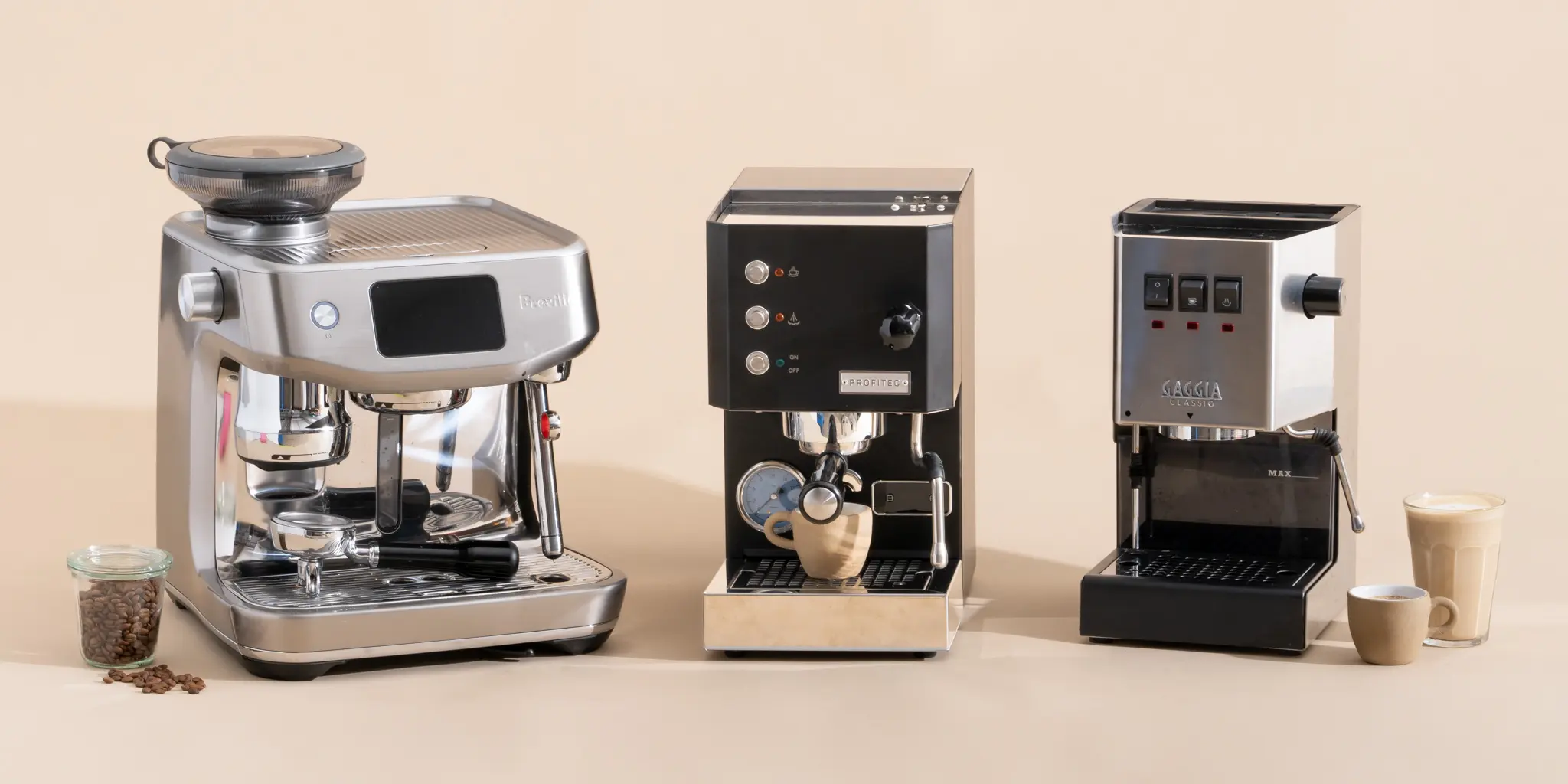
7 Expert Tips for Operating Your Café Espresso Machine
How do you ensure your espresso machine delivers exceptional beverage quality, operates efficiently, optimizes preparation time, maintains cleanliness without shortening lifespan, and avoids operational interruptions? Follow these seven expert guidelines:
Tip #1: Use Only Pure, Quality Coffee Beans
Use exclusively natural, pure coffee beans that meet quality standards. Absolutely avoid beans treated with compounds like butter, fish sauce, salt, or other additives—these cause machine components to corrode and rust rapidly, leading to expensive repairs or complete machine failure.
Tip #2: Establish Regular Cleaning Schedules
Base your cleaning frequency on daily extraction volume. External components like portafilter handles, steam wands, and tampers require daily cleaning or cleaning after each service period. Group heads need thorough cleaning every three days to prevent coffee oil buildup that affects taste and creates blockages.
Recommended Cleaning Schedule:
- Daily: Backflush group heads, clean steam wands, wipe down exterior
- Weekly: Deep clean portafilters and baskets, inspect gaskets and seals
- Monthly: Descale if needed (depends on water hardness), replace worn gaskets
- Quarterly: Professional servicing and inspection
Tip #3: Use Filtered Water Only
Only use filtered water that has removed chlorine, sediment, heavy metals, and other impurities. Water quality directly affects coffee flavor and machine longevity. Poor water creates scale buildup inside boilers and valves, eventually causing expensive damage.
Water Quality Standards:
- Total dissolved solids (TDS): 75-150 ppm ideal
- Calcium hardness: 50-100 ppm
- pH level: 6.5-7.5
- Chlorine: 0 ppm (completely removed)
Invest in a quality water filtration system—it’s cheap insurance protecting your expensive equipment investment.
Tip #4: Keep Machines Stationary
Maintain machines in fixed positions; avoid frequent relocation. Movement loosens connections, strains components, and can cause leaks or electrical issues. Once properly positioned and leveled, leave your machine in place.
Tip #5: Prevent Liquid Spills Inside Machine Body
Never allow ingredients like milk, powder, or water to spill inside the machine chassis. Internal liquid contamination causes electrical shorts, corrosion, and component failure requiring expensive repairs.
Tip #6: Ensure Proper Electrical Connection
Connect electrical systems correctly and safely from installation. Verify proper voltage, adequate amperage, grounding, and circuit protection. Improper electrical setup creates fire hazards and damages sensitive machine electronics.
Most commercial espresso machines require:
- Dedicated circuits: Separate from other equipment
- Proper voltage: 110V or 220V depending on model
- Adequate amperage: Typically 15-30 amps
- Grounding: Essential for safety
Tip #7: Operate Within Specified Capacity
Use your café espresso machine within the manufacturer’s rated capacity specifications. Exceeding designed limits causes premature wear, inconsistent quality, and shortened machine lifespan. If your volume consistently exceeds machine capacity, upgrade to appropriate equipment.
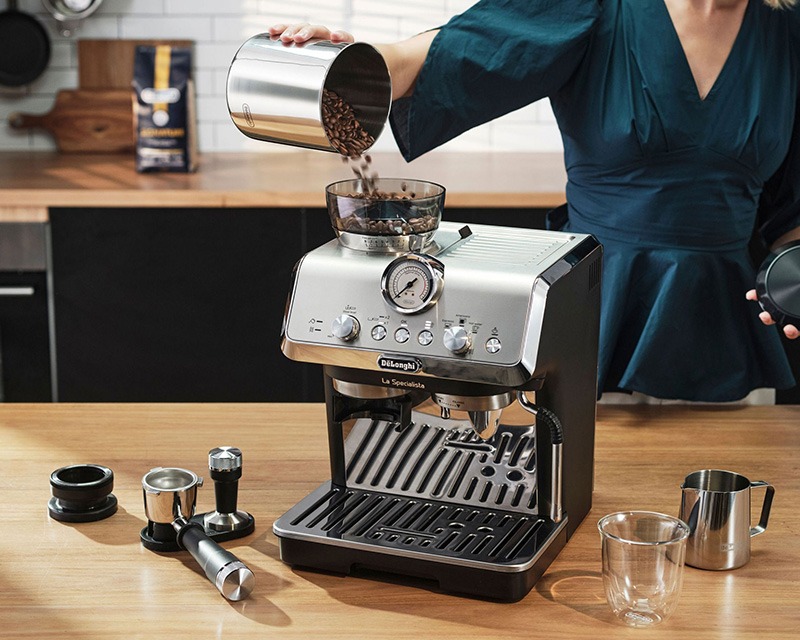
Additional Considerations
Budget Planning
Commercial espresso machines represent significant investments:
- Entry-level commercial: $3,000-$7,000
- Mid-range professional: $8,000-$15,000
- High-end premium: $15,000-$30,000+
Remember that your machine is a long-term investment. A quality machine properly maintained will serve your café for 10-15 years, making the cost-per-drink surprisingly economical.
Training Investment
Budget time and resources for proper barista training. Even the best espresso machine produces mediocre coffee in untrained hands. Consider:
- Manufacturer training: Many brands offer training with purchase
- Specialty coffee courses: Organizations like SCA offer certification
- Ongoing education: Regular skills development for staff
Maintenance Budget
Plan for ongoing maintenance expenses:
- Regular servicing: $200-$500 quarterly
- Replacement parts: Budget 5-10% of machine cost annually
- Water filtration: Replacement cartridges every 3-6 months
- Cleaning supplies: Backflushing detergent, descaling solution, group head brushes
Matching Grinder to Machine
Your espresso machine is only as good as your grinder. Budget appropriately:
- Commercial grinders: $800-$3,000
- High-end grinders: $3,000-$8,000+
A $10,000 espresso machine paired with a $200 grinder is like putting economy tires on a sports car—you’ll never achieve the quality your machine can deliver.
Conclusion
These guidelines provide comprehensive information about common mistakes when selecting café espresso machines, essential criteria to consider, and expert tips for machine operation.
When you’re ready to equip your café with the right espresso machine, Hello 5 Coffee can help guide your selection process. As a roaster deeply invested in café success, we understand that great equipment paired with exceptional coffee creates the foundation for thriving coffee businesses.
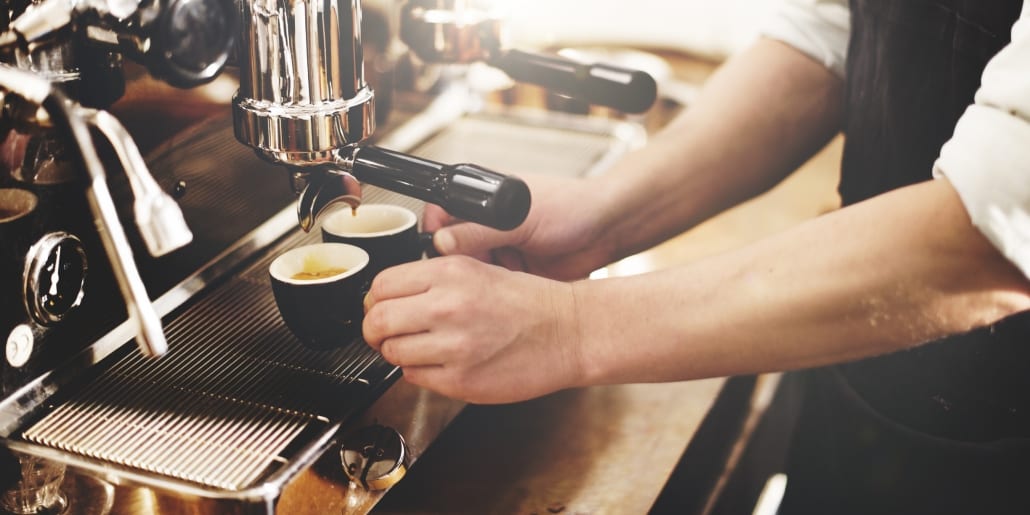
We wish you success in choosing the professional espresso machine that will serve as your café’s heart and soul!
Why Hello 5 Coffee? Your Premium Vietnamese Coffee Partner
Quality Coffee Makes Quality Espresso
Once you’ve invested in the perfect espresso machine, the next critical decision is choosing the right coffee. Hello 5 Coffee specializes in supplying, exporting, and wholesaling premium Vietnamese coffee to cafés worldwide. Since 2012, we’ve been the trusted partner for café owners who demand exceptional quality from their coffee suppliers.
What We Offer Cafés Globally:
- Premium Vietnamese Coffee Beans: Specialty-grade Robusta and Arabica from Vietnam’s finest growing regions
- Wholesale & Export Services: Reliable supply chain to cafés, restaurants, and distributors worldwide
- OEM/Private Label Services: Build your own coffee brand with our expertise—we’ll roast, package, and deliver under your label
- Custom Roast Profiles: Tailored specifically for espresso extraction to complement your machine capabilities
- Consistent Quality: Every shipment meets the same exacting standards your customers expect

Why Vietnamese Coffee for Your Espresso Machine?
Vietnamese coffee, particularly our premium Robusta varieties, delivers exceptional crema, bold body, and the intensity that espresso lovers crave. Our Arabica offerings provide balanced acidity and complex flavor notes perfect for specialty drinks. When extracted through quality espresso machines, our beans showcase why Vietnamese coffee is gaining worldwide recognition in specialty cafés.
International Standards & Certifications:
- Halal Certified – Serving diverse customer bases
- HACCP Compliant – Food safety guaranteed
- International Export Experience – Reliable shipping worldwide
Our Commitment to Café Success:
- 100% pure coffee—NO fillers, corn, soybeans, or artificial flavors
- Advanced processing (wet method and honey process) for superior bean quality
- Consistent supply for uninterrupted café operations
- Competitive wholesale pricing with volume discounts
- Flexible packaging options for retail or back-of-house use
OEM/Private Label Services:
Looking to build your own coffee brand? We offer complete OEM and private label solutions:
- Custom roasting to your specifications
- Branded packaging with your logo and design
- Recipe development for signature blends
- Quality assurance maintaining your brand standards
- Flexible order quantities from small batches to container loads
Perfect for café chains, specialty roasters, distributors, hotels, and restaurants wanting their own branded coffee line without investing in roasting equipment.
Connect with Hello 5 Coffee:
- Hello 5 Coffee Global Joint Stock Company
- Email: info@hello5coffee.com
- Phone: (+84) 81 535 5505
- Head office: No. 73, To Hien Thanh Street, Ha Dong Ward, Hanoi, Vietnam.
